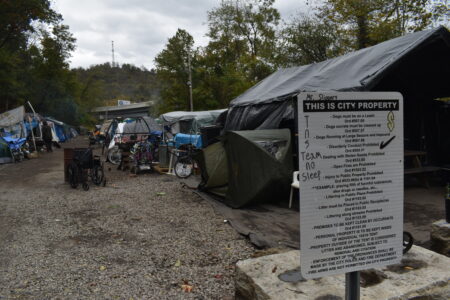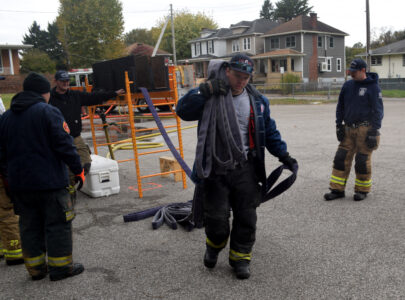Service Providers Dispute Claims About Bed Availability as Wheeling Sets Homeless Camp Closure for Dec. 1

photo by: Eric Ayres
The exempted homeless camp at the former city dog pound site north of the Interstate 70 overpass above Wheeling Creek has grown significantly this year. City leaders in Wheeling are taking action to close the camp before winter.
WHEELING — Heads of social service agencies that work directly with Wheeling’s homeless population dispute city officials’ assertion that enough shelter space will be available when the city closes its only exempted camp location on Dec. 1.
A majority of Wheeling City Council members voted Tuesday night to support a recommendation that City Manager Robert Herron close the exempted homeless camp for the winter. Less than 24 hours after that vote was cast, an official notice was posted early Wednesday at the camp alerting residents that the site will be closed on Dec. 1.
Wednesday’s notice, signed by Herron and dated Oct. 22, cited the city’s ordinance prohibiting camping on public property, which was approved by city council in 2023.
All members of city council with the exception of Councilman Ty Thorngate voted to recommend the closure of the exempted camp for the winter. Those supporting the recommendation noted that they did not wish to provide an option for people to stay out in the cold when shelter beds and other options are available.
John Moses, executive director of The Life Hub, and other social service agency leaders on Wednesday said this was not true.
“Here’s the math,” Moses said, noting that The Life Hub at the former First English Lutheran Church on 16th Street downtown provides year-round shelter now, but only in the evenings. “We have 52 beds at The Life Hub. We had 48 people last night. There are 71 people in the camps. So my math might (be off), but it sounds like we’re working against negative numbers here.”
The Life Hub is the only low-barrier shelter in the region. There are some other shelters and services that provide housing for homeless individuals, but many have strict requirements. Officials indicated that agencies like the YWCA can house women in domestic crises, Helping Heroes can house veterans in need, Youth Services System works with juveniles and provides emergency residential care, and other providers can shelter individuals who meet eligibility.
The only rule at The Life Hub’s low-barrier shelter mandates that there is no violence or threats of violence, according to Moses, who noted that individuals who have displayed such behavior have likely been banned from other shelters in the region.
Overnight shelter at The Life Hub provides individuals with a place to sleep. The Life Hub provides other services and works to connect those in need with a variety of resources. But the shelter does not provide space for people to keep their personal possessions there.
Moses noted that providing shelter in the region is getting even more challenging with other facilities either closing or at capacity already.
“The Salvation Army (in Wheeling) doesn’t take individuals anymore,” he said. “To my knowledge, the Northwood shelter is often, if not always, full, so when they squeeze that balloon, where are the rest going to go?”
That sentiment was shared Wednesday at the exempted homeless camp, which has grown significantly over the past several months. Residents on hand Wednesday pointed out the notice that had been posted on a bulletin board at the entrance of the camp earlier in the day.
“Where are we supposed to go?” said one man, who declined to be identified.
Becky Shilling-Rodocker, executive director of the Soup Kitchen of Greater Wheeling, expressed concern Wednesday about the future of the local homeless population in light of the city’s recent action.
“With the homeless, we don’t know what we’re going to do,” Rodocker said. “That is a huge decision to be made by people who work part-time for the city when we know the problems. Where do you put people? It was not perfect, but we could take care of people from there. We were taking care of them and they were not breaking the law. It’s just a mess.”
Moses said he was surprised and disappointed that the city is taking this action before meeting with providers to discuss it.
“I was very shocked, simply because a problem without a solution just leaves everybody sitting on their hands,” Moses said. “The community was upset when a lot of these people were camping in the woods and in other places, and that’s going to happen all over again. I think what they fail to realize is that there are some people — whether there’s a bed opportunity available or not — who simply do not go into shelters.”
A lot of people at the camp have a level of significant substance addiction and mental health issues, Moses noted.
“It’s not a simple problem to solve, and I get all of that,” he said. “It’s not been simple for a number of communities around the nation.”
Some city leaders have expressed concerns over the condition of the exempted camp over the past year, threatening to recommend its closure if service providers did not step up to help keep the site clean. Residents, particularly citizens living in the Fulton area, have complained about activity related to individuals staying in the camp. Some residents have complained of vehicle break-ins and regularly finding discarded drug needles in their neighborhoods, pointing to residents of the homeless camp.
Wheeling Mayor Denny Magruder this week described the exempted homeless camp as a “failure” for both the residents of the camp and the neighboring citizens.
Moses said the extent of the dilemma of homelessness is growing in the region and throughout the country. Urban Mission Ministries is closing its shelter for the Steubenville area on Oct. 31, Moses noted.
“There is a shelter in the Beckley, W.Va., area that’s closing due to a lack of funding,” he added. “We’ve gotten calls from the Beckley area to see if we can accept any of their people. It’s like dropping a big rock in a small pond – the ripples are going to go everywhere.”
The Life Hub was able to secure enough funding to expand its services from being a winter shelter to operating a year-round, low-barrier shelter. But it takes a lot of work, a trained staff and funds from a variety of sources to make even an overnight-only shelter available.
There is a lot of “aggressive solicitation” for funding taking place just to maintain operations at The Life Hub as is, Moses said, noting that they were fortunate to receive a $100,000 grant from the Department of Human Services. However, that is still not enough to employ staff for a 12-month period, Moses said, noting that donations from the community are critical.
“Every year, we put on the hustle,” he said. “The community has been pretty generous, so thank God for that.”
Moses indicated that there was no guarantee that donors will continue giving every year, making service providers fear potential impacts of “giving fatigue” that may happen in the future.
The remote site south of the entrance of the Peninsula Cemetery near Wheeling Creek – formerly the site of a city dog pound – had been exempted from the ban by the city manager and has been used as a centralized homeless refuge since last winter. The exempted camp had been relocated to the dog pound property from a previous location further down the creek along what is known as the Maintenance Trail, where the exempted camp was originally established after the camping ban was enacted.
Moses said he expected the city manager to meet with officials from The Life Hub in the very near future. Although Herron is not a voting member, he is a member of The Life Hub’s board of directors, Moses noted.
When word about the homeless camp’s potential closure resurfaced this week, Moses said he initially hoped to at least be able to negotiate. If the exemption was going to be pulled, closing the camp at the beginning of winter seemed to be the least optimal time of year for those who will be displaced.
“Just to slam the door on people without a plan in mind is unbelievable,” he said, noting that a closure in April would at least give residents several months of warmer weather to figure out somewhere else to go. “If it were a natural disaster, there would be school gymnasiums to keep people safe and fed until the crisis has passed. But it doesn’t look like we’re going to get that kind of participation.”





